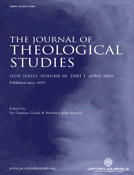-
Views
-
Cite
Cite
Mark D. Chapman, How Christian Is our Present-Day Theology? By Franz Overbeck, The Journal of Theological Studies, Volume 60, Issue 1, April 2009, Pages 331–333, https://doi.org/10.1093/jts/flp023
Close - Share Icon Share
Extract
Martin Henry is to be congratulated for this excellent and highly readable translation of Franz Overbeck's controversial text of 1873, together with the preface and postscripts from the second edition of 1903. As one of the most iconoclastic theologians of the nineteenth century, Overbeck (1837–1905), professor of New Testament and early church history at Basel from 1871 to 1897, exerted a powerful influence over a generation of post-First World War theologians, including Karl Barth, who were equally dissatisfied with the theology in which they had been raised. For Overbeck, since Christianity was fundamentally eschatological and ‘non-political’ (p. 63) and concerned with a completely different world, all attempts to connect Christianity to the present day were doomed to fail. While he conceded that his views on modern theology—and this meant all theology, since all theology was at some point ‘modern’ rather than eschatological (p. 193)—could be regarded as the ‘confessions of a crank’ (cited on p. xvii), he nevertheless pushed the anti-historical character of theology to its limits. Often written with a bitter irony (e.g. p. 68), Overbeck's book is dismissive of writers from both liberal and conservative (‘apologetic’) camps, most of whom are long forgotten. In his lengthy introduction, which serves to contextualize Overbeck's writings, Henry points out that Overbeck's antagonism to theology was not purely academic, but shared much with the cultural critique of his friend Friedrich Nietzsche (pp. 21–6). If Christianity could no longer relate to history, then its relevance for the whole of western culture was thrown into confusion.



